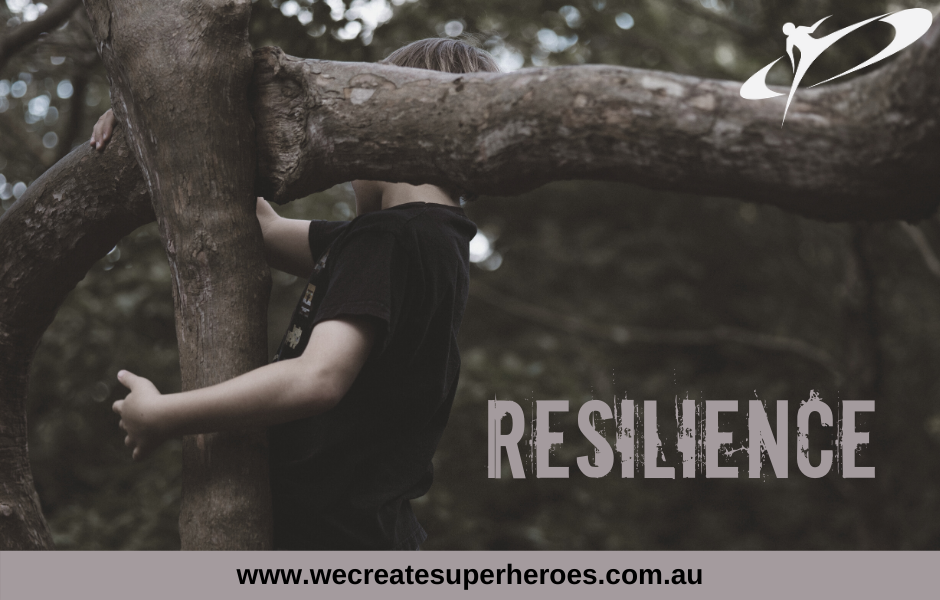There has been a lot written in recent years about the importance of kids developing resilience. It is said they need to have grit and a growth mindset to set them up for success in life. These are indeed some of the skills we teach our students in our superhero programs, the lessons of which have their introduction in developing confidence.
We teach our students that confidence is believing in themselves and what they can do. We explain that resilience is like a superhero suit that helps them battle adversity and makes them strong on the inside. Even when children are resilient, they require confidence to recognise their strength. That is why we teach these concepts together: so that students develop the skills to recognise their capacity to bounce back.
Self belief vs External validation
When teaching about confidence and resilience, we look at identity and values. We work on practical strategies to address challenges children might face, teaching them how to be themselves despite pressure from others to conform. We promote the development of confidence through self belief, rather than through external validation. This is because we want children to truly believe that how they see themselves is what is important, and that what others think of them does not matter if they are being true to themselves. When children have this core understanding of themselves and their values, they can stand more strongly in the face of difficulties, even when being challenged by others.
How we speak to ourselves matters
We teach the importance of language in establishing a positive attitude. What people say to themselves can make all the difference in how they feel, how they behave, and how they learn when faced with difficult or challenging situations. We use a solution framework for addressing and surviving challenges, working on positive reframing as the first step to developing a positive, growth mindset.
Growth mindset and the value of effort-based praise
There are many ways to encourage children to develop positive mindset of being able to achieve anything they wish. One way is to switch our praise language to reward and encouragement for effort resulting in achievement, rather than for achievement in its own right. Of course, being good at something can be a natural ability as well as something acquired with effort. However, praising a child for being brilliant at maths when they get a good grade is not nearly as effective as praising them for working hard to get whatever maths grade they achieved. This also teaches them that their achievement is a product of their efforts.
If children are rewarded for things they are naturally good at, they learn to rely on what they see as a “gift” or ability. Our goal is to teach them to rely on hard work to get them from wherever they started to wherever they are trying to get. This is the reason a lot of kids who excel naturally at school learning or sports hit a wall when they get to high school. Suddenly, they don’t find it as “easy” any more. Surely a child who works hard to achieve a C deserves as much (or more) recognition as a child who gets an A without studying or trying at all.
Everything can be learned
We are not born with set levels of ability in any area of life. The understanding that progress can be made with effort is what leads to a life without limits. This is known as a “growth” mindset. Failure is seen as an opportunity to improve rather than as a setback. Kids who do not learn this develop a “fixed” mindset, and often don’t progress past what comes easily to them. They tend to give up when things start to require work to move further forward. Wouldn’t it be wonderful if they learned to work hard from the beginning, no matter how easy it was for them?
Why do we expect to be awesome at something we’ve never tried before?
Positive self talk is fundamental to building resilience. It is an incredible thing how easily we fall into self-deprecating, negative self talk. Think of the last time you did something for the first time. There is a sense of apprehension, which is normal for the unfamiliar. And often, an immediate response of “I can’t!” before we even give something a try. Even if we are able to throw ourselves in and try something new without that initial resistance, we might not get it right straight up.
This is normal too, of course. Why would we expect to be awesome at something we’ve never tried before? Yet we live in a world of instant gratification. And following a generation of fostering the notion that we can do and be anything, we have lost sight of the idea that while this is indeed true, it is not true without effort and practice. Nor without a positive attitude to learning and practising. And nor without remembering that the journey and adventure is, of course, as important as the end outcome.
Successful Failure
“Failure” happens, in all its glorious and magnificent ways. Sometimes in its private and frustrating ways. In the end, it isn’t the outcome that matters. It is the attempts that are important. It is trying again, and working to overcome, to get better at something. And it is telling yourself you can in the face of the possibility that you can’t. These are far more important than whatever outcome is achieved. What if I can’t do it? What if I try and don’t succeed? Well, what if you can? What if you do? Try again. Reframe your expectations.
“The moment you doubt whether you can fly, you cease for ever to be able to do it.”
― J.M. Barrie, Peter Pan
